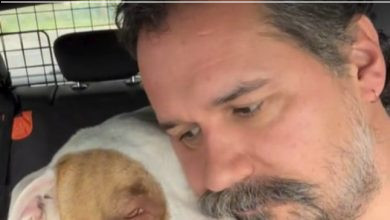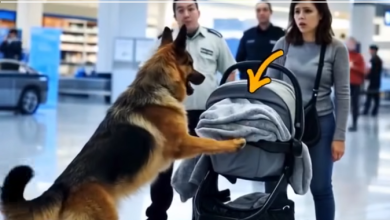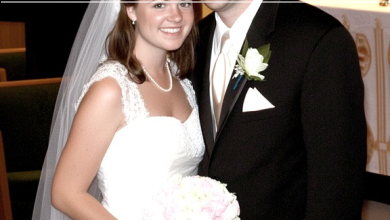He had no home and no family—only the cat who curled up on his chest each night. “She chose me,” he said softly. “That’s what counts.”
I first noticed him outside the all-night laundromat, curled up on a torn camping mat like it was the most comfortable place in the world. A small, orange cat with half an ear missing lay stretched across his chest, rising and falling with each breath he took.
He looked calm, but the years had clearly worn him down—shoes held together with duct tape, a trash bag as a backpack. That kind of life.
I started bringing leftovers from the café where I worked overnight. Just little things—a muffin here, a cup of soup there, once a forgotten grilled cheese. He never asked. Always said thank you. Always made sure the cat ate first.
One night, I sat beside him and asked her name.
“Hazel,” he said softly, rubbing the patch behind her damaged ear. “She chose me. That’s all that matters.”
Over time, he shared parts of his life. How his brother stopped returning calls. How his mother died alone three winters ago. How shelters turned him away because Hazel wasn’t allowed—so he chose the streets to stay with her.
“She’s the reason I keep going,” he whispered once, more to himself than to me.
Then one day, he vanished.
Three days passed. No sign of him. No Hazel. The sidewalk outside the laundromat sat cold and empty.
I asked around. Some said a city crew had cleared the area. No one knew more than that.
Until this morning.
On my walk to work, I spotted her—Hazel—sitting near the bus stop, staring at me like she’d been waiting. She looked thinner, her coat dull, but it was unmistakably her.
I knelt, half-expecting her to run. But she didn’t. She walked right up and brushed against my leg.
I picked her up gently. She didn’t resist, just tucked her head under my chin like she remembered me. I turned around and brought her home, late for work but certain it was the right thing.
She slept soundly in a makeshift bed I lined with an old sweater. That night, she curled up beside me. It felt temporary, like she was still waiting for him.
I called every shelter and hospital I could think of. No luck. No one had a record of a man with an orange cat named Hazel.
At the vet the next day, they found a microchip—registered years ago at a low-income clinic. No name. No updated info. “She’s healthy,” the vet said. “Just a little underweight.”
Weeks passed. Hazel adjusted—sunny windows, quiet naps, little adventures. But every time we passed the laundromat, she perked up.
Then one rainy afternoon at the café, a woman came in holding a soggy cardboard sign. I recognized her—June, one of the street angels who handed out socks and snacks.
“You used to sit with Martin, right?” she asked.
Martin.
I froze. “That was his name?”
She nodded. “Yeah. Him and Hazel. Everyone knew them.”
I told her everything. Her face fell.
“I heard he collapsed near the tracks. Someone said he was taken to County General.”
I called the hospital, this time with a name.
They had him.
Martin had been in a coma for two weeks—severe pneumonia from exposure. No ID. No family on record.
I left work early and rushed there.
He was thinner, hooked up to machines, barely recognizable—but it was him.
I sat by his bed and spoke gently. Told him Hazel was safe. That she hadn’t given up.
Three days later, he opened his eyes.
“Hazel?” was his first word.
I cried and promised I’d bring her.
The nurses bent the rules that day. When I carried Hazel into that room, she jumped onto the bed like no time had passed. Martin cried silently, stroking her fur.
“She found you,” he said.
“She waited,” I replied. “She knew you’d come back.”
He slowly recovered. Hazel stayed with him by day, with me at night. When he was strong enough, the hospital helped him apply for transitional housing. I helped with the forms, set up an email, made the calls.
A nonprofit offered him a small studio in a converted motel. It allowed pets.
The day he moved in, Hazel walked through the door like she owned the place.
We set up his home together—blankets, kitchen supplies, even a donated TV. He looked around and said, “I never thought I’d have this again.”
A month later, the story took a turn.
A woman about my age walked into the café. She said, “I think you’ve been helping my uncle. Martin?”
She hadn’t seen him in years—family rifts, unresolved pain. But someone had shared a photo online of Hazel curled up in Martin’s new apartment.
“I thought he was gone,” she whispered. “I never stopped thinking about him.”
I gave her his address. They reunited the next day. It was hesitant at first, but healing had begun.
Martin didn’t just get back on his feet. He began to live again.
He started volunteering at the very shelter that once turned him away because of Hazel. They’d changed their rules after hearing his story.
And Hazel? She’s still his queen.
As for me, I visit. Bring muffins. Let Hazel nap in my lap.
Sometimes, all it takes is a simple act of kindness—a sandwich, a moment of listening—and everything begins to change.
Because one cat chose one man.
And that man never stopped choosing her.
If there’s anything this story proves, it’s this: We all need someone to believe in us. To choose us.
And sometimes, just being that one person… can save a life.



